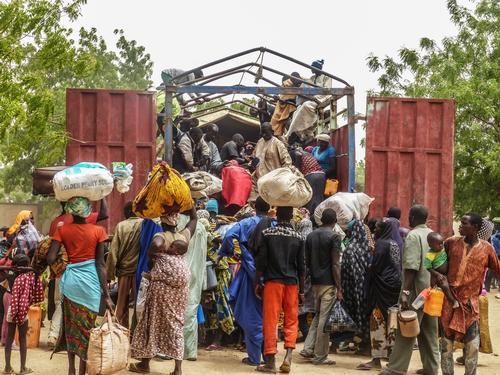With the arrival of thousands of people to Diffa town, fleeing from possible attacks by the armed group Boko Haram in the villages of Lake Chad, MSF has stepped up its response in the area to assist this population. The organisation has been working in the Diffa region since last December, assisting both local population and displaced persons and refugees. In this interview, Abdalla Hussein talks about MSF’s work in recent months.
Why did MSF decide to start working in Diffa?
The conflict in northern Nigeria with the armed group Boko Haram has forced thousands of civilians to cross the border, seeking refuge in different settlements in the Diffa region, in southern Niger. In December 2014, the United Nations estimated that 150,000 Nigerian refugees and Nigerien returnees had arrived in the area since the beginning of the crisis in May 2013.
Given the proximity of Diffa to the epicentre of the conflict and the shared border, and especially after Boko Haram occupied key border towns such as Damasak and Malam Fotari at the end of 2014, the atmosphere of insecurity has increased in Niger itself.
For this reason, MSF started working in Diffa last December. The first thing we did was to respond, together with the Ministry of Health and other medical organisations, to a cholera outbreak that lasted until January 2015. And at the same time, we started offering free healthcare to both refugees and the local population.
In February, several attacks by Boko Haram in the districts of Diffa and Bosso caused population displacements towards the interior of Niger and we had to evacuate our team for five days. However, as of late February, the people began to return and, today, most of them are back and we have extended our activities.
What are the main needs of the population?
People are in need of food, water, shelter…the basics! There are also important health needs, especially in the district of Bosso where access is limited due to security risks and where health staff have difficulty returning after the violent events of February this year.
Another of the main needs of the population is access to secondary care. The referral system is dysfunctional due to a combination of factors, including distance, transport costs, the current ban on motorcycle use – the most common means of transport – because of the state of emergency in force in Diffa, and finally, the security situation in certain areas. Therefore, we are planning to reinforce the referral of severe patients.
Moreover, violence is still present, especially in border villages that continue to be attacked and completely burned down. For example, victims that recently fled from Gachager witnessed deplorable events in their village, such as the murder of family members or looting.”
We are also concerned about the nutritional situation in the coming months if food aid organisations and the government do not make more of an effort to cover the needs. To the ‘hunger gap’ that is repeated each year must be added the shortage of food production last year in this region, the current conflict and displacement, the access problems to reach certain populations and the ban in force on the means of transport that used to bring products from Nigeria.
What activities is MSF carrying out in Diffa?
MSF is currently working in the districts of Diffa and Nguigmi, supporting four health centres. One of them is a maternal and child health centre in Diffa town, where we provide quality primary and secondary care to both refugees and the host community.
In the coming weeks, we plan to support two new health centres in the most affected areas in the district of Bosso. Moreover, given the ongoing meningitis epidemic in the country, we will reinforce our epidemiological surveillance in collaboration with the Diffa health authorities. We also want to support existing health facilities during the malaria peak in the coming months.
Furthermore, we also did an essential non-food items distribution for more than 8,700 refugees and internally displaced people (IDPs) last April.
Are the population movements in the area continuous?
Now we are seeing the people fleeing the islands in Lake Chad for fear of violence in the area. During the months of March and April, there were also new arrivals of refugees along the river Komadougou. For instance, at the commune in Gueskerou (Diffa district) where MSF is working, 4,270 new refugees and returnees have been registered since early March.
Most of the refugees stay with the local people, as they have family ties, but in some other areas, like in Bosso, there are refugees who have to set up their own makeshift shelters wherever they can.
Unlike traditional camps, the way that refugees and IDPs settle in this area complicates our work, since their needs are less visible and the geographical dispersion of the settlements makes it more difficult to reach the most vulnerable population.
In addition, we are at a point where the initial hospitality of the host community is exhausted, for two main reasons. First, the local community has less and less to share with the refugees, and second, the February security problems have led local people to associate refugees with Boko Haram. Precisely because of this, MSF is assisting both refugees and IDPs, and the local population.



